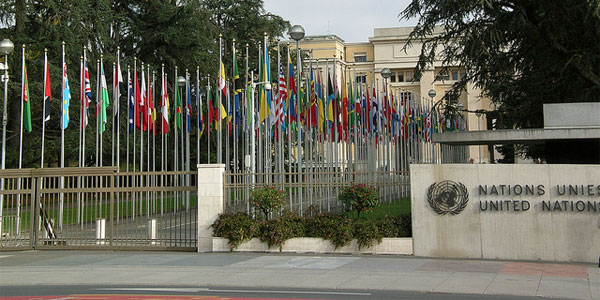11th January 2022 Geneva, Switzerland
Disarmament blog: looking back and forwards

I was going to use this blog post to write about the Nuclear Non-Proliferation Treaty Review Conference, which was due to begin in New York on 4 January. Instead, the week before we were due to travel, it became clear that the Omicron situation in New York made it impossible for the UN to host such a large meeting safely, and so States Parties agreed to postpone it yet again. We’re still working on finding a new date, but we’re all determined to get it done as soon as we possibly can.
Instead, inspired by the double-faced Roman god Janus, I’m going to use the first blog of 2022 to look both forwards to a busy year, and back at some of the highlights of the three months since my last blog post marking the start of the UK’s Presidency of the Convention on Cluster Munitions. (I know that’s an unpardonable gap!)
There were two particular highlights from the end of 2021. The first was the adoption by the UN General Assembly – on Christmas Eve – of the UK-sponsored resolution ‘reducing space threats through norms, rules and principles of responsible behaviours’, now resolution 76/231. This resolution builds on the UN Secretary-General’s report commissioned by the 2021 resolution, by establishing an Open-Ended Working Group of all UN Member States to examine the question further. The OEWG will meet in four sessions over two years in Geneva, starting in February. I’ll say more about it in my next blog.
The second big event of late 2021 was the Review Conference of the Convention on Certain Conventional Weapons in December. This Convention covers, amongst other things, incendiary weapons, land mines, booby traps and IEDs, and explosive remnants of war. But the main outcome of the meeting was a renewed mandate for the Group of Government Experts on Lethal Autonomous Weapons Systems (LAWS). The new mandate marks a shift from deliberations on principles to consideration of proposals and elaboration of possible measures for dealing with the problems. Certainly some delegations and civil society organisations wanted to go further than that, and start negotiating a treaty immediately. But this new mandate challenges all sides of the debate to put their ideas on the table. The next round of discussions kicks off in March.
Those two issues, along with the CCM Presidency and the NPT RevCon, will be our major priorities in 2022. But there’s one more: the Biological and Toxin Weapons Convention RevCon, which should have taken place last November, and now due in August. While it doesn’t get the same level of attention as its sister treaties on nuclear and chemical weapons, the BTWC is a crucial instrument, which opened for signature 50 years ago this April. The Covid-19 pandemic has reminded us of the dangers of disease, and the importance of international cooperation and preparedness, both of which are at the heart of the BTWC. My hope is that this will be the year the BTWC will get the international political attention it needs and deserves, and that it emerges from the RevCon stronger than ever.
So, a busy and hopefully productive year ahead. There’ll be plenty to write about – and I promise you won’t have to wait three months till the next post.
Thank you. We are going ahead.
“a busy and hopefully productive year ahead” I hope so! At.te, Labelgrafi